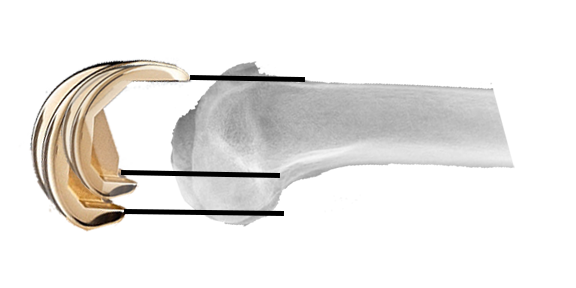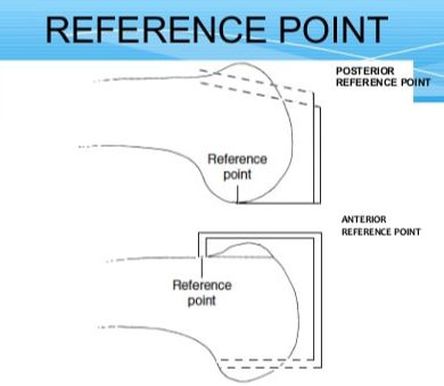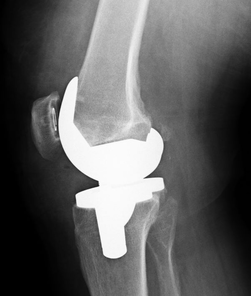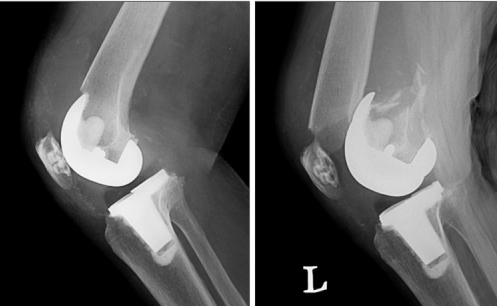Anterior reference knee replacement is a revolutionary knee approach to knee replacement. Learn everything you need to know about the signs and symptoms you may need a knee replacement and contact us to schedule a consultation at a Georgia office near you.
Everything You Need to Know About Anterior Reference Knee Replacements:
Everything You Need to Know About Anterior Reference Knee Replacements:
- What Is the Anterior Reference Knee Replacement?
- Common Causes and Symptoms of an Anterior Knee Replacement
- Types of Knee Replacements
- Anterior vs. Posterior Referencing Total Knee Replacement
- Anterior Reference Total Knee Replacement Surgical Procedure
- What Is the Most Common Reason Knee Replacements Fail?
- Anterior Knee Replacement Knee Pain
- Anterior Reference Total Knee Replacement Recovery
What Is the Anterior Reference Knee Replacement?
Anterior hip replacements have become unanimously successful, and as a result, we have engineered the Anterior Total Knee Replacement. While closely guarding our technique, our surgeons have been essential in developing equipment to take the rotational imbalances out of total knees using an anterior reference-based system to size the knee.
Common Causes and Symptoms of an Anterior Knee Replacement
When it comes to knee pain, it is prevalent for arthritis of various types to be the cause of your pain and possible disability. Unless you have sustained an injury from something such as an accident or sports-related injury, you may likely have arthritis, and this is causing your discomfort.
Depending on the progression and type of arthritis you have, anterior reference knee replacement surgery may be an option for you. There are a few types of arthritis that often cause severe pain and trauma to your knee. These include:
Having arthritis, though, does not mean that you absolutely must have knee replacement surgery. Discussing your options with our experienced surgeons at Atlanta Bone and Joint at any of our three convenient locations should be your first step in deciding whether or not surgery is the right choice for your health. We will examine your knee and ask if you have any of the following symptoms, which may indicate the need for surgery:
Given your specific medical situation and any of these symptoms, our doctors will decide if anterior reference knee replacement surgery is right for you.
Depending on the progression and type of arthritis you have, anterior reference knee replacement surgery may be an option for you. There are a few types of arthritis that often cause severe pain and trauma to your knee. These include:
- Osteoarthritis - This type of arthritis known as “wear and tear” because it often develops as people age and has been actively using their joints for many years throughout their lives. The cartilage between the bones at the joints has begun to wear down. When the bones rub against one another, the result is quite painful.
- Rheumatoid Arthritis - When the synovial membrane becomes inflamed and thickened, this can cause cartilage loss, pain, and stiffness because it is chronic.
- Post-traumatic Arthritis - This is most common after sustaining an injury. Fractures of the bones surrounding the knee can damage the articular cartilage over time. This will likely result in pain and limited function to the knee.
Having arthritis, though, does not mean that you absolutely must have knee replacement surgery. Discussing your options with our experienced surgeons at Atlanta Bone and Joint at any of our three convenient locations should be your first step in deciding whether or not surgery is the right choice for your health. We will examine your knee and ask if you have any of the following symptoms, which may indicate the need for surgery:
- Severe knee pain or stiffness
- Difficulty doing everyday activities such as walking or climbing stairs
- Moderate to severe pain while resting
- Consistent knee inflammation and swelling (rest and medication do not provide relief)
- Bowing in or out of the knee
- No improvement with other types of treatments such as medication, injections, or physical therapy
Given your specific medical situation and any of these symptoms, our doctors will decide if anterior reference knee replacement surgery is right for you.
Types of Knee Replacements
Knee replacement is the surgical treatment for severe knee pain and degeneration when all other treatment methods have proven useless. From pain medication to physical therapy and injections, there are various non-surgical options available, but often it comes to the point where surgery is a necessity.
At Atlanta Bone and Joint, our experienced surgeons will thoroughly examine your knee’s condition and determine whether or not surgery is the best option. You will then tell us when you are ready for your surgery.
At Atlanta Bone and Joint, our experienced surgeons will thoroughly examine your knee’s condition and determine whether or not surgery is the best option. You will then tell us when you are ready for your surgery.
Tourniquet-Less Knee Replacement
It used to be a standard procedure to use a tourniquet during knee replacement surgery, but that is no longer the case. Advancements have been made, so that blood restrictions during the surgery are not necessary. Without the tourniquet, our surgeons can reduce pain, blood loss, and operating time. Patients' muscles also recover faster, and there is a lower risk of blood clot development.
Unicompartmental (Partial) Knee Replacement
The knee is made up of three compartments. If only one of those compartments has arthritis or loss of cartilage, then it is possible for surgery to be completed on just that area rather than the entire knee (partial knee replacement surgery). Only with a thorough examination and understanding of your medical history can our experienced doctors at Atlanta Bone and Joint determine if you are the right candidate for this type of knee replacement surgery.
Total Knee Replacement
In the location where the surfaces that glide against each other in the knee are cut in line with a prosthesis, this is known as a total knee replacement. Currently, a knee replacement can last 25-30 years, depending on your activity level and knee use. At Atlanta Bone & Joint in Decatur, Loganville, or Snellville, Georgia, you can rest assured knowing that only a certified surgeon will perform your surgery. We will never allow a resident to learn from you while you are under our care.
Kneecap Replacement (Patellofemoral Arthroplasty)
The joint surface underneath the patella and the trochlea (the groove where the kneecap resides while the knee bends) is called the patellofemoral joint. Suppose your arthritis is isolated to this specific joint. In that case, our Decatur, Loganville, or Snellville, Georgia, surgeons at Atlanta Bone & Joint can perform a patellofemoral knee replacement instead of a total knee replacement.
This joint often wears down on people who squat very often during their everyday lives. This type of procedure is rare since arthritis is not usually isolated to only this joint, and patients will often have degenerative issues elsewhere.
This joint often wears down on people who squat very often during their everyday lives. This type of procedure is rare since arthritis is not usually isolated to only this joint, and patients will often have degenerative issues elsewhere.
Complex or Revision Knee Replacement
If your total knee replacement surgery happens to fail, we can essentially redo the surgery through a revision knee replacement to avoid significant pain and disability. Surgery failures occur due to various reasons such as infections, alignment problems, plastic wear, dislocation, stiffness, heterotopic ossification (rare), and component failures.
If you believe that your knee replacement may have failed, you must contact our experienced surgeons at Atlanta Bone and Joint as soon as possible to schedule a revision knee replacement.
If you believe that your knee replacement may have failed, you must contact our experienced surgeons at Atlanta Bone and Joint as soon as possible to schedule a revision knee replacement.
Anterior vs Posterior Referencing Total Knee Replacement
For many years, the posterior referencing total knee replacement was the industry standard for knee replacement surgery. However, at Atlanta Bone and Joint, we have moved beyond the age-old industry standard for a better, more innovative technique that yields better results, less pain, and faster recovery for most patients - the anterior reference total knee replacement.
We believe that innovation is key to surgical procedures because our goal is to restore our patients' health and well-being as efficiently and effectively as possible. Our updated techniques ensure that we continue to do so and that our patients reap the many benefits.
We believe that innovation is key to surgical procedures because our goal is to restore our patients' health and well-being as efficiently and effectively as possible. Our updated techniques ensure that we continue to do so and that our patients reap the many benefits.
Anterior Reference Total Knee Replacement Surgical Procedure
If knee replacement surgery is your best option to return you to a pain-free life, you can count on the specialists at Atlanta Bone and Joint to use an anterior reference technique for the best results. While most doctors use posterior referencing total knee replacements, our doctors always start from the anterior position. Ask our doctors to explain in person or check out our learning center! This is the future of knee replacement.
What Is the Most Common Reason Knee Replacements Fail?
The most common reason total knee replacements fail is due to component malpositioning. Most prevalently, the location of the failure is the patellofemoral joint (the articulation between the kneecap and the thigh bone) being overstuffed. That means that due to surgeons doing posterior referencing, they are unable to control the joint's size and our surgeons. Our surgeons can avoid notching the femur with this guidance system and avoid making the patellofemoral joint too tight. By controlling this variable better, we have had astonishing results with less patellofemoral pain after surgery!
Other common reasons that knee replacements fail are infections and metal allergies. Infections, unfortunately, are sometimes a part of the surgical process. At Atlanta Bone and Joint, we are among the best at eradicating infections by using the newest cleaning techniques and the highest amount of antibiotic concentrations in our antibiotic spacers, but infections may still arise. We are here for you to eliminate the infection, should you develop one post-surgery. Be sure to let us know in your medical history if you have any of the following risk factors: BMI > 50, smoking, chronic steroid use, chronic kidney disease, HIV, and others.
Metal allergies and nickel sensitivities are on the rise in our country, so you must identify if you have a metal allergy before your knee replacement surgery. We have put together a resource designed to help you determine if you might have an allergy and ways to prevent them from occurring after surgery.
Other common reasons that knee replacements fail are infections and metal allergies. Infections, unfortunately, are sometimes a part of the surgical process. At Atlanta Bone and Joint, we are among the best at eradicating infections by using the newest cleaning techniques and the highest amount of antibiotic concentrations in our antibiotic spacers, but infections may still arise. We are here for you to eliminate the infection, should you develop one post-surgery. Be sure to let us know in your medical history if you have any of the following risk factors: BMI > 50, smoking, chronic steroid use, chronic kidney disease, HIV, and others.
Metal allergies and nickel sensitivities are on the rise in our country, so you must identify if you have a metal allergy before your knee replacement surgery. We have put together a resource designed to help you determine if you might have an allergy and ways to prevent them from occurring after surgery.
Anterior Knee Replacement Knee Pain
Following your surgery, you will likely experience some pain, as it is the body’s natural response to the healing process. Our doctors at Atlanta Bone and Joint will prescribe some pain-relieving medications for short-term use to reduce your pain.
There are various pain management medications to choose from, including opioids, nonsteroidal anti-inflammatory drugs (NSAIDs), acetaminophen, and local anesthetics. If you are taking opioids, it is imperative that you reduce and then stop taking them once the pain improves. If you find no reduction in your pain level after a few days post-surgery, call us as soon as possible.
There are various pain management medications to choose from, including opioids, nonsteroidal anti-inflammatory drugs (NSAIDs), acetaminophen, and local anesthetics. If you are taking opioids, it is imperative that you reduce and then stop taking them once the pain improves. If you find no reduction in your pain level after a few days post-surgery, call us as soon as possible.
Anterior Reference Total Knee Replacement Recovery
Because every patient is different, the recovery process will not be the same for every surgery. However, there are specific steps and parts of the process that everyone will undergo to heal from knee replacement surgery properly. First and foremost, it is essential to set reasonable expectations. You will not be running a marathon only a couple of short weeks after surgery (though you will likely be walking on the day of your surgery), and you may experience some setbacks throughout the process. Don’t get discouraged. It is common to feel pain after the surgery, which is why we may prescribe medications. It is also a normal experience:
You should contact us if you become aware of other types of complaints that are not typical such as:
During your appointments leading up to the surgery, our doctors at Atlanta Bone and Joint will discuss all of this and risk factors for prolonged pain and an expected return to activity lost so that you know what to expect and when.
- Clicking
- Popping
- Numbness on the outside of the knee
- Knee swelling
- Stiffness
- Decreased flexibility
- Trouble sleeping
You should contact us if you become aware of other types of complaints that are not typical such as:
- Drainage lasting longer than seven days
- Calf swelling and tightness
- Shortness of breath
- Inability to walk on the leg
- Your leg becomes shiny
During your appointments leading up to the surgery, our doctors at Atlanta Bone and Joint will discuss all of this and risk factors for prolonged pain and an expected return to activity lost so that you know what to expect and when.
Schedule a Consultation at an Office Near You!
If you think it’s time for a knee replacement, schedule an appointment at our total joint replacement center. We are ready to find a solution to help you live a happier and more pain-free life. Give us a call and see how we can help!
Office HoursMon-Fri: 9AM-5PM
|
Telephone |
High School Football Season Added Coverage HoursSaturdays During High School Football Season
Injury Clinic is for INJURED PLAYERS ONLY. Snellville ONLY. 9AM-10AM MEDIA ROOM |





